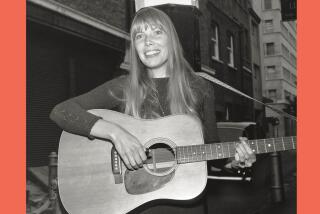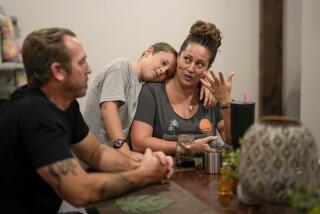‘Back Home’ Brings Tear to Her Eye
SAN DIEGO — Once upon an afternoon several years ago, Sue Mitchell just got sick of it. She got sick of not feeling cold. She got sick of not seeing leaves--big, colorful leaves falling out of trees--other than palm or eucalyptus.
Most of all she got sick of not having a pal to reminisce with.
Mitchell has her husband, of course. They’re happily married, have been for years. But she had an idea of talking to somebody--somebody here--about the job back home. Somebody like a co-worker. Mitchell had been a court clerk in Anna, Ill., the town she was born and grew up in and, from time to time, longs to return to.
Someone told her that a former newspaper reporter from Illinois was living in San Diego. She called him up. They exchanged sentiments of homesickness and made a date for lunch. She waited and waited. He never showed.
For months she felt jilted and, strangely, more homesick than ever. Several more months passed, and in an aside to an otherwise irrelevant conversation, Mitchell learned that the man had died--only hours before the lunch date.
That made her really homesick.
Mitchell has been out here since October, 1978. She’s not really sure why she and her husband drove out. All the kids (seven in all) were grown and gone, and at the time (probably a winter afternoon), the fantasy of palm trees swaying like swizzle sticks looked good. Just about unbeatable.
The Mitchells wanted to live on the beach, of course. “Doesn’t everybody who comes to San Diego?” She laughed. “And then you find out about the prices!” The Mitchells settled for a mobile home in Spring Valley.
Almost eight years later, Mitchell has a good job, working at the courthouse in El Cajon. Two of her children live here now, and church work at Skyline Wesleyan Church in Lemon Grove has brought dozens of new friends. Mitchell is convinced that community involvement is the only real cure for lingering homesickness, the only hope for making your new home your real home.
Still, she clings to “things Illini.” It’s no accident that her daughter went to a recent Cubs-Padres game and rooted so hard for Chicago that she cried. Just thinking about “back home” brings a tear to Mitchell’s eye. She cried like a baby when her son told her recently that he hasn’t been able to drive by the house (in Anna) since his parents left town. He’d go miles out of his way, or he’d cry, too.
“We left all the kids in the yard crying, and one daughter pregnant,” she remembered. “I felt so guilty, I cried all the way out. In Arizona, I looked behind me at a truck carrying everything I owned. I said, ‘That’s all of me, and it’s not in Illinois.’ ”
Even she wonders why she left. She talks to others who wonder why they left. Nobody seems to have answers. But hardly anyone goes back.
“You can start a conversation out here,” she said, “just by saying, ‘Where you from?’ The strange thing about California is, it doesn’t seem real. We sometimes wonder why we don’t go back. More of our home is somewhere else. The weather hooks you in, and, it makes you passive.
“My husband recently suffered a stroke and then had heart surgery. I wouldn’t want to move him because of the weather back there.”
Part of the mood is having grandchildren in Illinois. Getting to see them is a rarity; getting in touch even more of one.
“You can only ‘reach out and touch someone’ on the phone every now and then,” she said, laughing. “And it’s never the same.”
Technology is wonderful for enhancing communication, she said, but she’s convinced that “it’s the reason we’re all drifting apart.” As author Vance Packard said in naming his book, mobility and technology have made America “A Nation of Strangers.”
Every summer Mitchell participates in the World’s Greatest All-States Picnic in Balboa Park. This year’s event is scheduled for August as part of “America’s Finest City Week.” Representatives from every state fill booths, passing out brochures and chit-chatting about Texas, Oklahoma, Hawaii, et al . Mitchell dresses up as Mary Todd Lincoln, Abraham Lincoln’s wife.
From time to time she salivates over classified ads in the hometown paper that comes in the mail: “Log home, seven rooms, four bedrooms, two baths, on an acre and a half--$40,000.”
The movies in her mind are no longer beaches and palm trees.
They have been replaced by snow and leaves, and the faces of too many grandkids.


